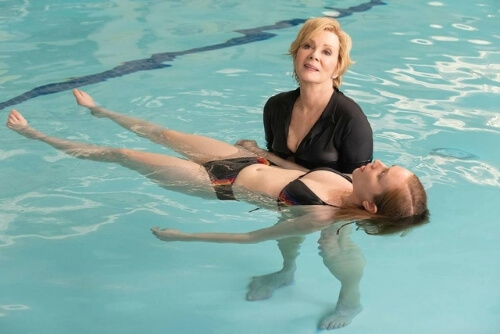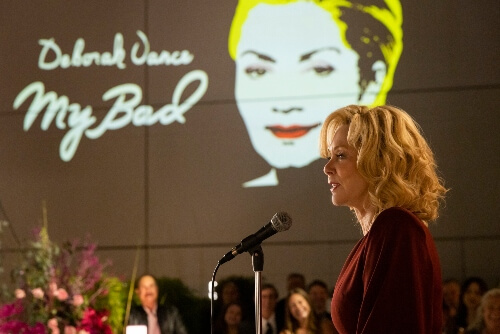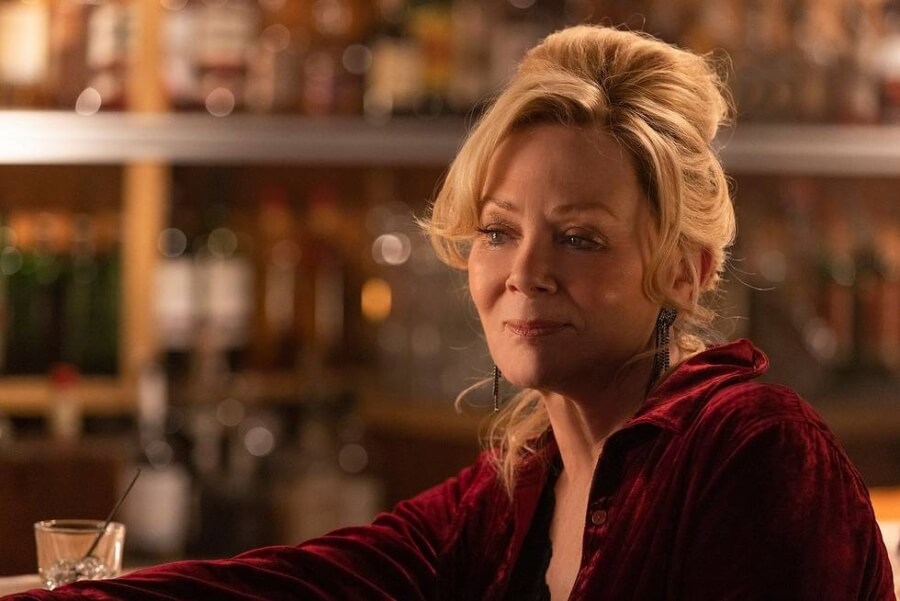With its second season now streaming on HBO Max, Hacks is a wildly smart and original intergenerational hate/love story. The premise: After losing her headliner status, a properly nipped-and-tucked, silk-kaftan-clad Joan Rivers’ type comedian (and QVC superstar) is forced to hire a very young, snarky, kombucha-sipping-female comedy writer to help contemporize her act. Cruel jabbing ensues.
As a title, Hacks could cleverly connote both becoming old and professionally stale and/or finding the secrets to improving your life, a cycle of ending and beginning. It’s a spectrum that both characters inhabit in a relationship that the show’s creators, Jen Statsky, Lucia Aniello, and Paul W. Downs, (writers on Broad City) have characterized as a “dark mentorship.”
The show is a knowing oasis in an otherwise terribly regressive moment for women.
That sounds creepy, but it means each takes a turn as mentor/mentee, mother/daughter, benevolent friend and utter monster. And in that way, neither character is given more value, which seems fresh.
Indeed, the two develop an unlikely chemistry, and a “will they or won’t they?” dynamic. That’s not in the Cybill and Bruce in Moonlighting sense, but rather, will one or the other drop her own stubborn shit long enough to learn and grow?
And by the finale of season two (spoiler alert), in contrast to Larry David’s famous anti-pronouncements about Seinfeld, some hugging and learning does happen. But it’s nuanced.
Read More: Julia Child vs. Betty Friedan? HBO’s “Julia” Gets to the Heart of 1960s Feminism
The Secrets of Hacks
Why is Hacks getting so much buzz? For starters, it’s built around the infinitely talented Jean Smart. It also features a tremendously talented and diverse cast. And, filled as it is with heightened insights about sexism, ageism, professional disappointment and intergenerational friendship, the show is a knowing oasis in an otherwise terribly regressive moment for women.
Jean Smart’s performance as the hardboiled Vegas star Deborah Vance earned her a well-deserved Emmy, one of three that the series received in its first season. The way she changes from thousand-watt performer to dining alone in her robe in her dark kitchen, with her dogs under her feet and her elaborate blonde Ivana-updo sitting on a foam head on her upstairs makeup table, is heart-rending. But the writers never leave it as anything that familiar; both the show and Smart surprise us by going deeper.
The characters develop a “will they or won’t they?” dynamic.
In the beginning of season one, the young Ava Daniels character, played by Hannah Einbinder, struck me as slightly underdeveloped—a Gen-Z bisexual, depressive, tote-bag-carrying wet blanket, who made Debbie Downer seem sparkly.
But as such, Ava’s a genius sparring partner for Deborah, a living landmark so rich that she has what Ava calls a “side mansion.” But with the loss of her long-time residency at the Palmetto Hotel Casino, she loses her identity, too. (The idea that she’s being replaced partly with EDM DJs does seem rather humbling.)
The two women share an agent, Jimmy (played with tremendous heart by show writer Paul W. Downs) who pushes disgraced-by-tweet, out-of-work L.A-based writer Ava to fly to Vegas to interview with Deborah, who has always written her own material.
The Generational Split

The age difference between the two main characters offers opportunities for comedy and poignancy.
It’s a genuine generational split: Ava doesn’t believe in punch lines at all, never mind punching them up. And Deborah doesn’t see the younger woman’s absurdist observations like “I had a nightmare that I got a voicemail,” as remotely funny.
“Traditional joke structure is very male,” Ava tells the woman who’s been a star for almost 50 years. “It’s all about the climax.” She also puts down Vance’s Vegas audiences as “Panera-people.”
Deborah, a gay icon of sorts whose stunning anti-lesbian bias later gets her thrown off a cruise, asks Ava if she’s a lesbian, given that she dresses like “Rachel Maddow’s mechanic.”
In response, Ava, arrayed in Carhartt and what Deborah deems “chimney-sweep boots” gives her an extremely clinical, graphic overshare about her bi-sex life that’s pretty hilarious. Deborah thanks her for her “Ted Talk.”
There are ghosts of others, but Deborah’s comedic profile (especially the QVC part, which Smart shines in) hews most closely to Joan Rivers. And like Joan’s, the inside of Deborah’s house looks like Versailles. But Rivers, who died at 81 and would now be 89, was a generation older than Vance. Much as Joan was beloved by some, her style of comedy, which tended toward jokes about fat people, “tramps” and racist imaginings (Madonna finding Tina Turner in her armpit) was already seeming out of touch.
Meanwhile, Deborah finds Ava lazy, and in her Zoomer self-righteousness, Ava thinks she’s too cool for the Deborah gig.
But once Ava starts cataloguing Deborah’s archive, she discovers that she once was a feminist trailblazer in an overwhelmingly male dominated comedy world. She had a wonderful pilot talk show that somehow was never picked up, which made her bitter. And over the years, she had to work three times as hard (and dance backwards, in high heels, as they say) “and it’s still not enough,” she tells Ava.
They have an uneasy working relationship for much of the show, which seems like the truth.
Going Deeper
By the second season, Einbinder (who happens to be Laraine Newman’s daughter, but in real life keeps that on the down-low) fully holds her own, and then some, against the always-lit Jean Smart, which is staggering.
And if anything, in the second season, the series has gotten darker, funnier, almost-kinder and more poignantly human.
Both women have to claw their way back into the ring.
And that’s when it hit me: It’s a show about facing failure through a female lens. That’s something most 50-plus women can relate to—and the hard-fought redemptive moments are even sweeter.
Deborah is a workaholic who is willing to do whatever it takes to regain her place at the top. Ava felt angry and entitled when she lost her writing job. Both have to claw their way back into the ring, but unlike Ava, who at one point whines, “Why does everyone have rich parents except for me?” hyper-competitive Deborah is used to it, and uses her anger as fuel, and also, perhaps as an excuse for being a bitch.
That’s also true in in subplot that feels a bit off. When Ava was at a low point because she felt so ill-treated by Deborah, she texted dirt on her boss to the writers of an English comedy show about a bitchy female PM. It seems for a minute as if Deborah will accept her mistake. But then Deborah slams Ava with a lawsuit over violating her NDA. It could bankrupt Ava, but somehow she continues to work with her, which seems a bit Stockholm Syndrome-ish.
Building Back Better

Deborah Vance on the road back to relevance.
Deborah doesn’t do anything in a small way. Ava had encouraged her to change her material, to get more confessional and emotional and less insulty. So Deborah decides to barnstorm the country, with her team living on her tour bus as she does small shows and county fairs, workshopping new material.
This provides an opening for a brilliant and too-short cameo by Laurie Metcalf as Deborah’s gonzo tour manager. “Name’s Alice. Everybody calls me Weed,” she says. “That’s a nickname Pete Wentz gave me, and once Pete gives you a nickname it sticks.”
Even one of Deborah’s stalkers runs away from her after a show.
She then gives Deborah and Ava a tour of Deborah’s blinged-out bus. Ava gets a tiny coffin like spot and a hook to hang her stuff on while Deborah has a luxurious bedroom/palace in the back.
But despite her on-the-road thread count, Deborah bombs. And bombs. Even one of her stalkers runs away from her after a show. Deborah confronts him in the parking lot, and he ‘fesses up that “it’s just not the Deborah Vance I’m used to.”
And then there’s an epiphany: Deborah understands that in trying to be confessional, she was playing off a sad caricature of herself, not her true self. She has always worn a mask, and has never been transparent about the savage degree to which she put her career first in her life, and what it cost her. She starts connecting with crowds and figures an alt route back into the industry by self-funding a special. And in another wonderful stroke of casting, real-life comic Susie Essman shows up as an out-of-work director who Deborah insists on hiring. The crew is afraid she’ll dodder, but she ends up being spectacular.
The special’s a hit. It’s bought by a network. She and Ava did it.
There’s a big surprise in the final episode, but this time Deborah acts out of selflessness and generosity toward Ava, and her mentee accepts it.
Deborah has come to terms with herself. “I take up lots of space,” she admits in her act, and poetically repeats the line, rhythmically putting it into different contexts. She ends by saying that the taking-up-space thing is pretty amazing for “a high-functioning anorexic.”
In the end, she and Ava will always have the fake Eiffel Tower, rather than Paris. But I’m sure there’s more to come with them and Deborah’s cold nurture.
There’s talk of a season three. We need it.
Read More: The Strange Mix on HBO’s Minx: Comedy, Feminism, and Dongs





















0 Comments